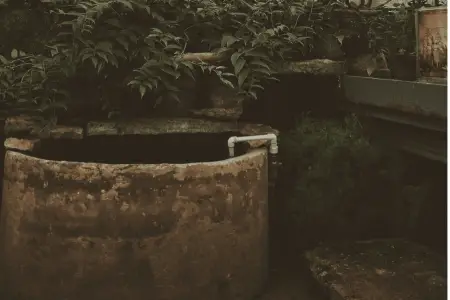One of the most common issues that people with wells run into is having black water or sediment mixed in with their well water. There are a number of reasons why your well water might be black, and getting to the root of the problem is crucial.
To get rid of black well water, you must first determine what’s causing the problem. Manganese deposits, rust and mildew buildup, or a faulty filter system are all possible reasons for black water. But generally a water softener or a good filtration system will help get rid of black water
Once you discover the root of the problem, you should be able to get rid of all types of black well water. However, it’s still essential that you act quickly before the problem can worsen. It might even be necessary to treat another part of your water system to keep the problem from recurring.
Why is my well water black?
Well water can get black for a number of reasons, including mineral deposits, rusty pipes, mildew growth, sediment, or an old filter system. Finding out why your water is black is crucial to resolving the issue. Let’s explore the possible options and remedies!
Mineral Deposits
Mineral deposits consisting of calcium, magnesium, iron, iron oxide, manganese, and more are a common problem with well water. Unlike city water, well water isn’t pretreated with chlorine and other chemicals to get rid of mineral deposits. The only way to get rid of mineral deposits making your water black is to install a water filtration system or water softener. These devices will capture the mineral deposits and remove them before entering your plumbing pipes.
Rusty Pipes
Rusty pipes are a prevalent problem when it comes to black well water. This is especially true in older homes that used cast iron or steel pipes in their plumbing systems. However, it’s important to note that if your water is rusty, it’s likely because you have an issue with your plumbing pipes rather than with your well.
Rust will make water appear black, brown, or discolored. However, if rusty pipes are causing it, it’s because the lines are rusting from the inside out. Cast iron was once a household favorite for plumbing pipes, but we have since discovered that these pipes rust from the inside out. The water coming out of your faucets will appear black or discolored when this happens. You’ll have to replace your rusty pipes to remedy the problem.
Mildew Growth
Mildew growth is also a common problem, but not as much as rusty pipes. Mildew can grow inside your pipes or water heater and cause the water coming out of your faucets to appear black. However, the problem lies with the mildew growing in your plumbing system rather than with the well water itself.
Black Sediment In Well Water
If you start to notice black sediment in your well water, there’s a good chance that your well system has collapsed. Wells are meant to last forever, but problems and accidents can cause the well to collapse. It’s also possible that one of your pipes has an underground leak, and dirt is falling into the pipe. Either way, the likely outcome is that you’ll have black sediment, dirt, or sand in your well water.
Old Filter System
Most water filter systems use granular activated carbon to soak up odors, tastes, and chemicals that you don’t want in your water. However, the carbon gets saturated over time and needs to be replaced. If you don’t replace your old filter in time, pieces of the carbon will break off and get into your water system, which will turn your water black.
How to remove Manganese from well water
Out of all the reasons that your well water is black, heavy manganese deposits are at the top of the list.
Manganese, in trace amounts, is actually good for the body. However, we only need less than 10 mg of manganese per day. If your well water is black, you have a much higher dosage than that, which is dangerous because high manganese concentrations have been linked to Parkinson’s disease. Let’s look at the three ways to remove manganese from your well water.
- Water Softener
A water softener is one of the most effective ways of removing manganese in its unprecipitated form. A softener has ions that interact with the manganese particles and force them to bind to resin inside the softener.
- Filter System
Once manganese has progressed to its physical precipitated state, a softener is no longer effective at removing it. Instead, you’ll need a water filter that can trap the physical pieces of manganese and remove them from the flow of water.
- Water Pretreatment
Water pretreatment takes manganese from its unprecipitated form and converts it to its precipitated form. Because only a water softener can remove unprecipitated manganese, pretreatment is required if you have only a filter system.
FAQ
What is the cheapest way to remove manganese from well water?
There are three proven ways to get rid of manganese in your water: a softener, a filtration system, or pretreating your water. Unfortunately, each of these methods can cost anywhere between $500 and several thousand dollars. Your best bet is to install a water softener yourself, as that is likely the cheapest method.
Will a water softener remove manganese?
A water softener is an excellent way of getting rid of manganese and other minerals in your water. However, a water softener only removes manganese in its unprecipitated form. If manganese has precipitated, it can damage your water softener.
Does boiling water remove manganese?
Unfortunately, boiling water doesn’t remove the manganese it contains. Boiling water that contains manganese will worsen the problem because boiling causes manganese to form concentrations in the water.
Final Thoughts
As you can see, there are several ways to get rid of black well water. However, it’s essential to play the part of a detective and discern the reason behind your black water. Only when you know what’s causing the black well water can you devise a solution to get rid of it. If you have black well water and can’t figure out the problem yourself, you should contact a plumbing professional immediately.

Nick Lopresti is the founder of YourH2Home and a home improvement expert. He has years of experience writing about various home improvement topics, mostly as it pertains to water systems.
